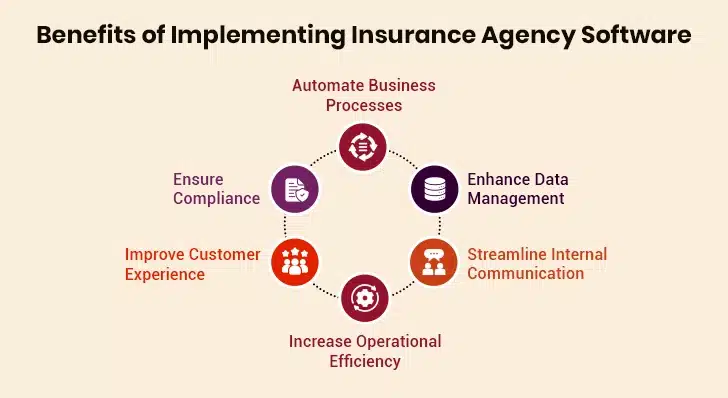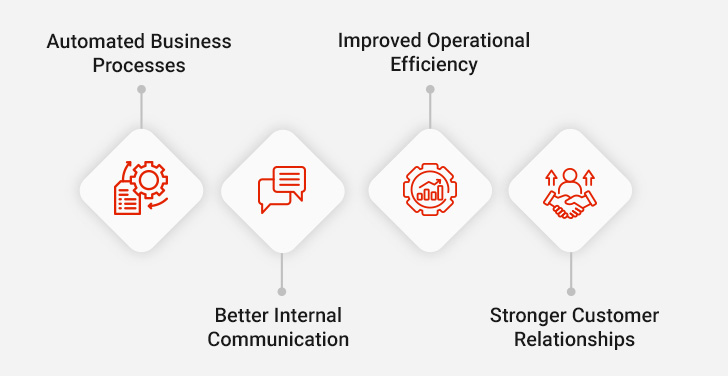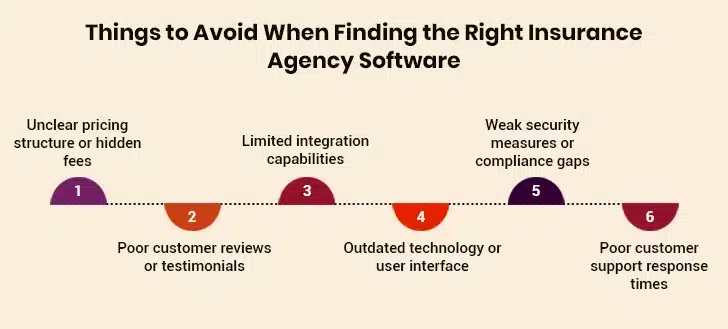Managing all the tasks manually is challenging, especially in an industry like insurance, which is highly document-intensive. Moreover, with the increasing volume of business pouring in every day, insurers face a tough time optimizing operations. They often end up compromising speed, efficiency, and costs. Thankfully, the introduction of digital technologies, shifts the entire focus to a new business model that aims to boost efficiency and increase the ROI of the insurance businesses. With the increasing volume of business pouring in every day, insurance companies face a tough time in optimizing operations. To mitigate inefficiencies and boost productivity, most insurers now use modern insurance agency software.
The insurance agency solution provides a complete view of tasks, sales, agent activities, account information, etc., for all stakeholders. Moreover, workflow automation enables insurance agents to store records in a single database and provide services through a unified platform. Such insurance management solution eliminates the need for multiple accounting algorithms and enables efficient management of client communications, databases, and documentation without requiring extensive manual intervention. All in all, these solutions help insurers overcome the challenges of manual paper-based workflows.
Whether for small agencies or large enterprises, these solutions are equipped with capabilities that add more time to each workday for insurers. Given this huge potential, the global insurance software market size is projected to reach USD 59.57 billion by 2033, with a CAGR of 3.6%. This growth also demonstrates the industry’s significant shift towards digital transformation.

Exploring the Importance of Comprehensive Insurance Agency Solutions

Exploring the Importance of Comprehensive Insurance Systems
The transformation of the insurance industry is being driven by technological innovations that fundamentally change how insurers operate, serve customers, and manage risk. Let us explore why a comprehensive insurance system is a necessity for insurance businesses:
1. Dashboard Management
Insurance agency software provides a snapshot of the agents’ time, productivity, commissions, and workflows. This lends transparency to monthly sales, pipeline statuses, and accounts. Having everything at-a-glance eases the work for the agent to identify trends, reduce errors and omissions (E&O), and spot potential fraud. This leads to more business and drives better results in terms of efficiency and productivity.
Additionally, the dashboards act as an impartial and unbiased platform that offers a viewpoint for analyzing the business’ overall performance. By centralizing data, dashboards help insurers identify areas for improvement and opportunities for growth, supporting continuous optimization across the business.
Furthermore, the integration of AI in dashboard management has revolutionized how insurance professionals interpret data. Modern insurance agency software solutions have advanced capabilities, including predictive analytics, enabling agencies to forecast market trends and customer behavior with remarkable accuracy.
2. Efficient Documentation
Efficient documentation is crucial for improving the efficiency of the insurance business. Insurance agency systems organize all the data into a single interface, including multiple carrier submissions, quotes and downloads, payments, ACORD forms, and templates to help agents create new policy packages. With a single dashboard, customer data becomes easily accessible. Without a well-managed dashboard system, countless hours are lost in gathering information across various carrier websites. It also streamlines the sales and leads management process efficiently.
In fact, the digital transformation of documentation processes becomes even more critical as the industry faces increasing regulatory requirements and compliance standards. Modern agency software solutions have automated compliance checking, ensuring that all insurance documentation meets current regulatory standards without manual oversight.
Apart from improving document accessibility and data quality, an insurance agency solution also minimizes the risks of cyberattacks and data theft. These systems add a layer of security via administrator access and granular permission controls, empowering insurance businesses to control data access with stakeholders.
3. Marketing Automation and Customer Lifecycle Management
Marketing automation is an essential tool to improve customer retention and increase lifetime value. The insurance agency solutions strengthen relationships to improve customer satisfaction with well-managed customer data and perfectly timed communications.
Modern agency software systems are equipped with set campaigns to ensure higher customer satisfaction, improved renewal rates, and greater opportunities to up-sell and cross-sell. All this occurs with least manual effort by the power of automation. Thus, insurers significantly reduce staffing costs and free up the agents’ time to work on generating more value. Moreover, insurance businesses use a single solution for combining their sales and marketing automation efforts.
Additionally, advanced ML algorithms in modern insurance agency solutions can predict customer behavior patterns. This enables proactive engagement strategies that significantly increase policy retention rates. The automation capabilities extend beyond basic marketing to include advanced lead scoring, automated policy renewals, and personalized communication sequences.
4. Customer Satisfaction
In the insurance industry, customer service is the essence of sales and marketing. For establishing long-term relationships with customers, insurance businesses must focus on fulfilling customer needs at every phase of their individual journeys.
With an insurance agency system, entire customer data is easily accessible. This enables insurers to accurately predict customer needs and offer personalized offerings. Customers are better satisfied with self-service portals in a digital system as these simplify claims filing as well as tracking and updating policies. The agency solution also sends reminders for renewals. Moreover, integrating AI-powered chatbots reduces customer response times by 60% while simultaneously improving customer satisfaction scores across all demographics.
5. Accounting and Reporting
Organizing reports is yet another time-consuming and mundane task for insurance agents. Insurance agency systems track payments and invoices along with monitoring the extent of damage. The insights from the data collected, such as notes, records, and detailed account histories of leads and policyholders, are time-stamped and easily accessible from a single searchable dashboard. As such, insurance software improves accuracy by providing real-time efficiency in reporting for data analysis. The reports are generated with automated features for regular profit tracking of individual policies. As a result, efficiency is boosted with analytical insights driven by automation of the insurance solution.
“In 10-15 years’ time, I see the insurance industry as having almost fully automated, AI-assisted end-to-end processes.”
– Megan Bingham-Walker, Co-Founder and CEO of Anansi Technology
In essence, software for insurance companies streamlines complex accounting and reporting processes and improves overall efficiency through real-time tracking and analysis. Now, let’s take a closer look at the advanced features fueling transformation across insurance operations.
Advanced Features Powering Modern Insurance Agency Solutions
As the insurance industry continues to embrace digital transformation, advanced features in insurance agency software solutions are setting new standards for operational excellence. These cutting-edge capabilities include:
Artificial Intelligence and Machine Learning Integration
The integration of AI and ML in insurance agency software systems has transformed underwriting processes, claims management, and risk assessment. AI and ML are rapidly reshaping the insurance industry by enabling more data-driven decision-making. These technologies are particularly transformative in customizing insurance policies and streamlining the process of claims processing.
Advanced AI algorithms can analyze vast amounts of data to identify patterns, predict risks, and automate decision-making processes that previously required significant manual intervention. This capability enables insurance agencies to process applications more efficiently, price policies with greater accuracy, and detect fraudulent claims with increased precision.
Internet of Things (IoT) Integration
The proliferation of IoT devices is creating unprecedented opportunities for insurance agencies to gather real-time data and offer more personalized services. Connected devices in homes, vehicles, and businesses provide continuous streams of data that can be used to assess risks more accurately and offer dynamic pricing models.
Insurance agency solutions that integrate IoT capabilities enable agencies to move from reactive to proactive service models, identifying potential issues before they result in claims.
Blockchain Technology Implementation
Blockchain technology is increasingly being integrated into insurance agency systems to enhance security, transparency, and trust. This technology provides immutable record-keeping, streamlines claims processing, and enables smart contracts that automatically execute when predefined conditions are met.
The implementation of blockchain in insurance agency software reduces administrative costs, minimizes fraud, and accelerates claim settlements, creating significant value for both agencies and their clients.
In a nutshell, an agency software solution’s ability to integrate with emerging technologies ensures that agencies remain competitive as the industry continues to evolve. However, the insurance marketplace is overflowing with agency software, each solution claiming to be the best.
In such scenarios, considering factors such as core functionality, automation capabilities, reporting and analytics, and mobile accessibility helps insurers find a solution that perfectly fits their needs. Additionally, stakeholders must also look for data encryption, access controls, backup systems, and audit trails to ensure data security.

At the same time, implementing insurance agency software is no easy feat. It is riddled with challenges such as configuration and integration, security and compliance, and user resistance. Following a few industry’s proven best practices can make the entire implementation process a cakewalk.
Insurance Agency Software Implementation Strategies and Best Practices
Successfully implementing agency software in the insurance business requires careful planning, stakeholder buy-in, and a phased approach that minimizes disruption to existing operations. Industry best practices include:
I. Change Management and Training
Effective implementation of agency software systems requires comprehensive training programs that ensure all team members can effectively leverage the new technology. This includes not only technical training but also change management support to help teams adapt to new workflows and processes.
II. Data Migration and Integration
One of the most critical aspects of implementing new agency software solutions is ensuring seamless data migration from legacy systems. This process requires careful planning, thorough testing, and often involves working with specialized consultants to ensure data integrity and minimal downtime.
III. Performance Monitoring and Optimization
After implementation, ongoing monitoring and optimization of insurance agency software systems is essential to maximize return on investment. This includes regular performance reviews, collecting user feedback, and implementing continuous improvement initiatives.
Conclusion
The most basic function of an insurance system is to make things easier for insurers by automating mundane, manual tasks. The quicker the implementation of the software, the more business the insurance agencies gain. The best insurance systems are those that save an incalculable amount of time, money, frustration, and lost business. And, therefore, investing in the right solution is important.
That said, the question is not whether to implement insurance agency software solutions, but rather which solution will best serve your agency's unique needs and strategic objectives. The time to act is now, as the competitive advantages of early adoption compound over time, creating sustainable differentiation in an increasingly crowded marketplace.
Case in Focus
A multinational insurance organization dealing with various types of insurance including health, life, and travel, was in dire need of modernizing core systems. The client’s home-grown legacy system was incompatible with modern technologies and contributed to inefficiencies. The client partnered with us to modernize their existing insurance system for seamless synchronization. As a result of the modernization, the insurer was able to reduce technology maintenance costs and business process unit costs by 15% and 20% respectively. See the full case study to learn all the details of the insurer’s modernization journey.
Originally published at https://www.damcogroup.com/blogs/drive-business-success-with-modern-insurance-agency-software


















